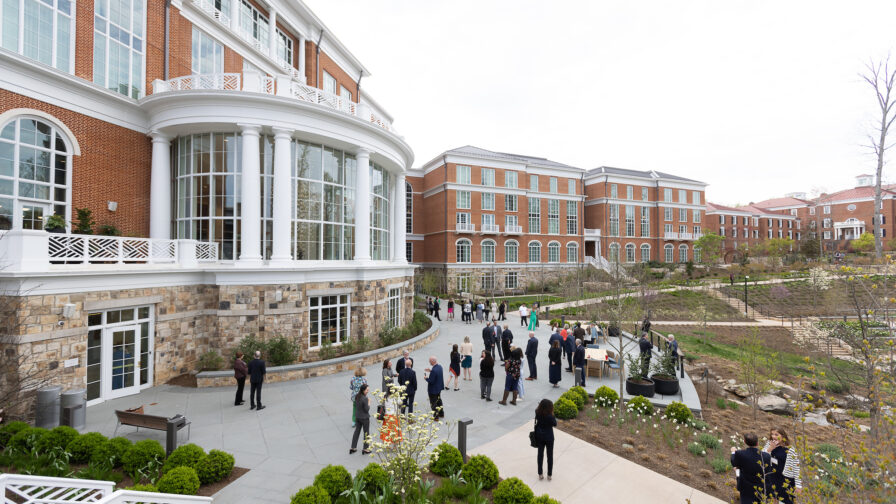
UVA Darden Sands Institute for Lifelong Learning Examines AI as Disruptive Force in Talent and Workforce Development
By Jay Hodgkins
Convening attendees from the education, private, and government and public policy sectors, the Sands Institute for Lifelong Learning at the University of Virginia Darden School of Business examined how artificial intelligence (AI) is accelerating the evolving landscape of lifelong learning and workforce development at its inaugural “The Future of Learning at Work Summit.”
The summit was the first in-person event convened by the Sands Institute, which was launched in 2020 following a record-setting gift from Frank M. Sands Sr. (MBA ’63) and the Sands family.
“The Sands family is thrilled to see the vision of the institute become a reality,” Frank Sands (MBA ’94), CEO of Sands Capital Management and chair of the Darden School Foundation Board of Trustees, said during his welcome address. “Lifelong learning has always been important to the Sands family. In the investment business, we are trying to figure out the future and profit from that. It requires a lot of curiosity and learning and creative thinking.”
Darden Dean Scott Beardsley opened the event by setting the challenge for the private, public and education sector leaders who are shaping the future of lifelong learning during an age in which AI is redefining what work humans need to do and what skills organizations need humans to possess.
“What does AI mean for human intelligence? It is being called into question. Humans need to keep learning. The lifelong learning ecosystem must evolve to meet cultural, political and technological catalysts,” Beardsley said. “After two decades of exponential technological growth, work as we know it is changing forever — yet key values endure. At Darden, we are unpacking what this means for tomorrow’s learners and leaders.”
Conference Themes, Brought to You by AI
To demonstrate the power of AI and the ways in which it is already impacting daily work, Sands Institute CEO Ashley Williams and Chief Digital Learning Officer Anne Trumbore shared Humata AI’s summary of key themes and takeaways from the event, based on transcripts from two days of sessions recorded by “AI meeting assistant” Otter.ai.
The technology’s key themes included:
1. Workforce Development and Education: The need to mobilize a highly trained workforce, increase enrollment of nontraditional students in higher education and develop AI literacy in schools and organizations to support economic and technological advancement.
2. Policy and Governance: The importance of working with government leaders to enact policies that support workforce development and address the ethical implications of AI, including privacy and fairness concerns.
3. Technology and Innovation: The role of AI and technology in bridging educational gaps, fostering innovation and preparing the next generation of leaders to manage significant changes and challenges.
4. Societal Impact and Future Visioning: Discussions on how education and workforce development should evolve to meet future societal needs, including rethinking the education system to prepare individuals not just for work but for active participation in a democratic society.
While the AI output drew criticism from some attendees about important ideas that were missed as well as a writing style described as “generic,” the demonstration left little doubt that AI is already serving as a powerful productivity tool for common work tasks, such as reporting back findings from meetings and events to team members or drafting communications from emails to grant applications.
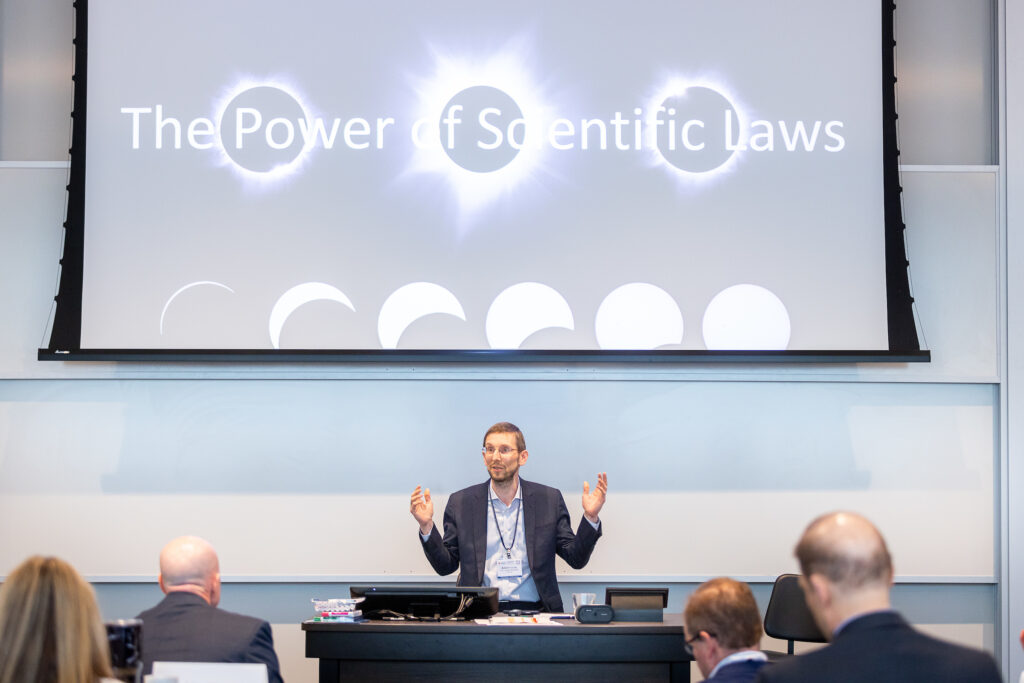
Darden professor Anton Korinek gave a presentation on the impact of AI on work. The conference occurred on the day of a partial solar eclipse.
The Impact of AI on Work, Workers and Lifelong Learning
Darden faculty members Anton Korinek, Roshni Raveendhran, Yael Grushka-Cockayne and Beardsley shared their thoughts and findings on how AI will shape the future of work — from what jobs will be left for humans to how AI impacts human behavior on the job to the new skills lifelong learning will need to prioritize to help workers thrive in the age of AI.
Korinek said there has been a reliable relationship between the investment to bring more computing power to generative AI models and the capabilities of generative AI. Given that the computing power behind generative AI models has doubled every six months for more than a decade, a trend he expected to continue for years, “the complexity of these models is quickly catching the complexity of our brains.”
The development curve puts generative AI on a path to bring massive increases in productivity throughout the economy, mostly in cognitive work, Korinek said, forcing humans “to the tail end of the curve” to the highest value work.
Raveendhran shared findings from her behavioral research designed to help organizations understand how they can best integrate AI capabilities in ways that enable employees.
In a study examining the effectiveness of performance feedback from AI, the researchers found humans benefited from it under the right circumstances. “When the feedback was entirely data driven and employees knew the data was all processed by AI and not humans, then people perceived it more as informational rather than evaluative,” Raveendhran said. Essentially, employees saw the feedback as a helpful guide to improve their performance, whereas feedback from humans could leave employees feeling negatively judged.
On the other hand, when AI was given planning and decision-making powers similar to a traditional human manager, the researchers found employees did not respond as well. “AI performing these functions leads to perception that the job they are doing is less complex and then they feel lower status and that they have lower value,” Raveendhran said.
In the education space, Beardsley worried AI could exacerbate the digital divide in access to the best educational resources.
“The digital divide as we know it will be exaggerated by who has access to the best version of generative AI. There will be a financial model that is not accessible to certain people,” Beardsley said. That reality raises several key questions, he said: Who gets access to AI? Is it a social good everyone should have access to at a fair price? Should it be subsidized by governments to ensure that goal?
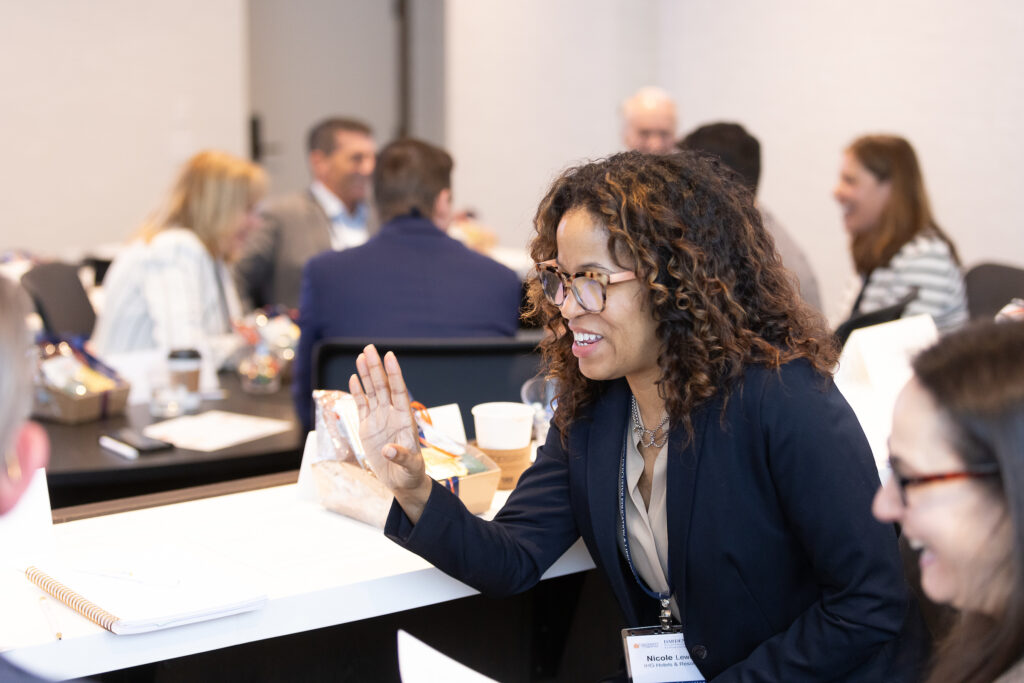
Attendees left little doubt that talent and workforce development had entered an era of rapid change. Pictured: Nicole Lewis, IHG Hotels & Resorts.
Rapid Change in Talent and Workforce Development
Attendees left little doubt that talent and workforce development had entered an era of rapid change — and that lifelong learning providers of all shapes and sizes will need to quickly adapt to the needs of employers and learners.
Investor and entrepreneur Lou Pugliese, speaking during a panel on edtech investing, said he had engaged in recent conversations with leaders at large tech companies, during which the executives said they planned to solve their talent and skill development crisis by taking matters into their own hands. He expects tech giants will try to acquire lifelong learning providers and adapt them to their own needs, putting them in direct competition with traditional education providers.
Big tech isn’t alone facing a critical talent gap. Leaders from the airline, hotel and other industries at the Sands event reiterated that finding the right talent quickly and efficiently was their most significant challenge, and that lifelong learning providers simply weren’t adapting fast enough to meet their evolving needs.
Not just a means to serve employers, lifelong learning providers could better serve workers, too.
Ryan Craig of Achieve Partners and author of the book Apprentice Nation noted that 52 percent of workers are underemployed, in large part because the “college for all” mentality of the past no longer works in an era of rapid change in which workers must constantly reskill as adults. Jack Mills of the Council for Adult and Experiential Learning said 54 percent of people in workforce don’t have a college degree, yet those workers develop incredible skills that go undervalued because employers and education providers haven’t found a way to properly credential or recognize their learning. Bryan Hancock of McKinsey & Co. And author of Power to the Middle said 42% of middle managers report feeling burnt out and that lifelong learning providers must create the right educational pathways to help them do better.
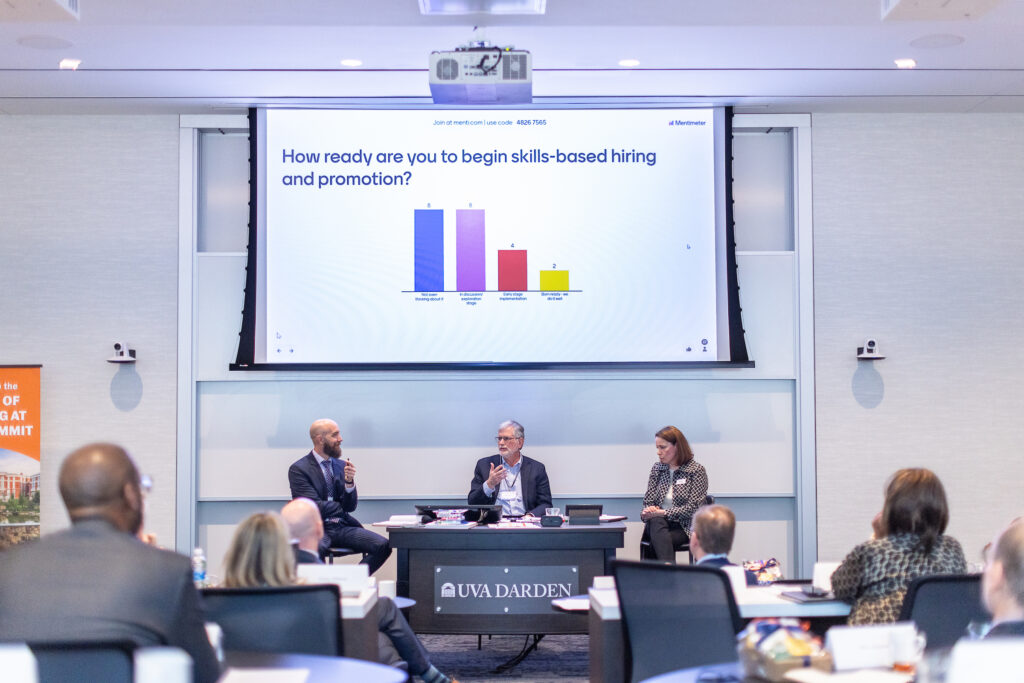
Carlo Salerno, Burning Glass Institute; Jack Mills, Council of Adult and Experiential Learning (CAEL); and Amy Heitzman, UPCEA, discussed skills-based education in a panel.
The conclusion among event attendees working in the education sector was that they must do a better job creating pathways for workers to connect with employers on new opportunities.
“We need a way to validate what people have learned through lifelong learning so employers can properly value it,” said The Burning Glass Institute Managing Director of Education Insights Carlo Salerno.
Efforts to establish a standardized system to recognize and credential skill development or create a scalable means to stack lifelong learning credentials into a highly valued level of attainment, such as a degree, remain elusive. Yet, there are some success stories guiding the latest efforts.
For example, Craig said the United Kingdom and Australia were apprenticeship laggards less than a generation ago, but both developed successful initiatives to grow apprenticeships in sectors across the economy by creating incentives for organizations to launch apprentice programs and for employers to hire those apprentices. The European Commission is establishing a system of verifiable microcredentials, digital wallets for all lifelong learners to store and validate their credentials, and incentives for employers to value those microcredentials.
Based on research conducted by the Sands Institute and The Burning Glass Institute on the large number of high-potential employees who often do not have a college degree and tend to work on the front line in industries like retail and hospitality, Trumbore said Darden will focus on creating pathways for this “hidden talent” to obtain learning credentials that allow them to be properly recognized for promotions into entry-level management. She said the research found there were 2.5 million job postings for “first-time managers” each year, and if 500,000 of those positions were filled with hidden talent within the company, it could create a $10 billion aggregate annual wage gain for workers who often come from disadvantaged backgrounds.
Despite the green shoots of success, Stand Together Trust Senior Fellow Steven Taylor said lifelong learning providers still had a long way to go to shift the hiring paradigm away from college degree-focused hiring.
“There’s performance pressure for hiring managers. Teams are overworked and underwater, so they are going to lean to the safe hire of a college credential because the risk of a bad hire is too high,” he said. “How do we get past that pain point? We need to help employers bring in talent that can perform ASAP with low risk.”
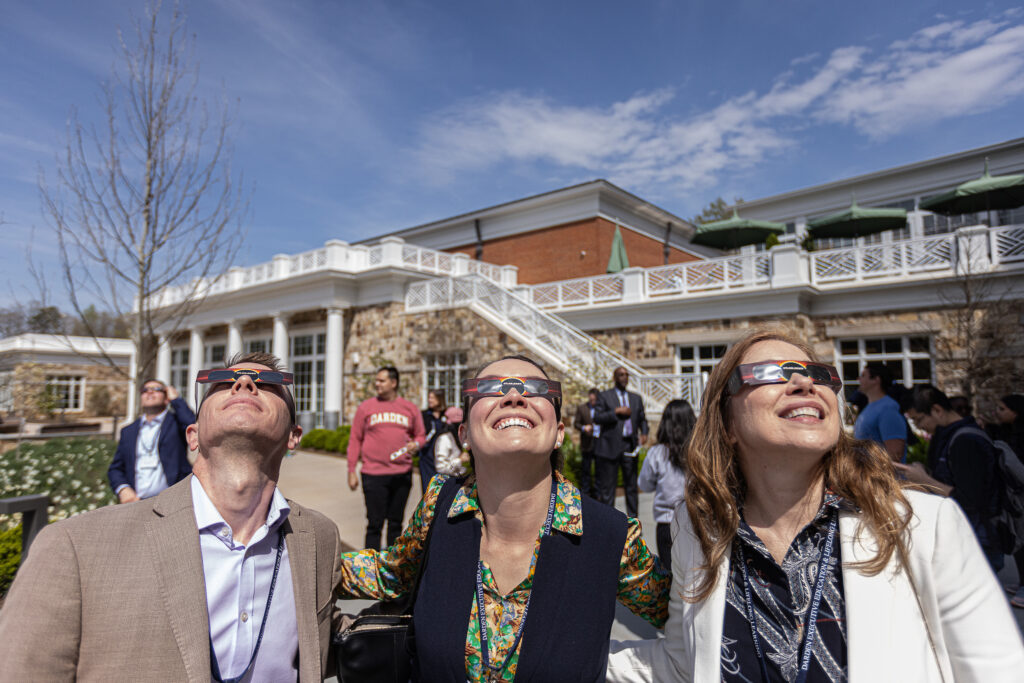
Attendees took a break to enjoy the partial solar eclipse on the first day of the conference. Pictured: Steven Taylor, Stand Together Trust; Nicole Overly, Commonwealth of Virginia; and Lesa Hanlin, UVA School for Continuing and Professional Studies.
What’s Next? Sands Institute to Shape a Different Model of Collaboration
Closing the summit, Williams and Trumbore facilitated a discussion on how to shape a new model of collaboration across the lifelong learning ecosystem to enable lifelong learning pathways capable of “supporting a sustainable, skilled and credentialed workforce that delivers on the promise of productivity and economic mobility.”
The Sands Institute for Lifelong Learning is committed to leading conversations to advance the future of lifelong learning by convening a diverse group of stakeholders at events such as The Future of Learning at Work Summit. Collaborating with these stakeholders to provide more learning and advancement opportunities for workers is consistent with the institute’s mission established by the late Frank Sands Sr. (MBA ‘63), a passionate lifelong learner who believed leaders must be able to continually grow, learn and develop to create positive change.
The University of Virginia Darden School of Business prepares responsible global leaders through unparalleled transformational learning experiences. Darden’s graduate degree programs (MBA, MSBA and Ph.D.) and Executive Education & Lifelong Learning programs offered by the Darden School Foundation set the stage for a lifetime of career advancement and impact. Darden’s top-ranked faculty, renowned for teaching excellence, inspires and shapes modern business leadership worldwide through research, thought leadership and business publishing. Darden has Grounds in Charlottesville, Virginia, and the Washington, D.C., area and a global community that includes 18,000 alumni in 90 countries. Darden was established in 1955 at the University of Virginia, a top public university founded by Thomas Jefferson in 1819 in Charlottesville, Virginia.
Press Contact
Molly Mitchell
Associate Director of Content Marketing and Social Media
Darden School of Business
University of Virginia
MitchellM@darden.virginia.edu





